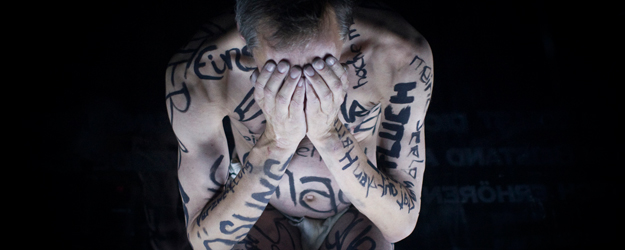12 January 2012
In the Mainz LyricsLab, poems emerge as multimedia experiences. Poetry is seen and heard, sometimes even smelled and tasted. This unusual teaching project began in 2011. In it, students at Johannes Gutenberg University and the University of Applied Sciences Mainz work together to cast lyrics in new forms.
The man cowers naked in a glass cube. Distraught, he stares into the darkness from where unseen pairs of eyes focus on him. His pale skin is covered with black letters. The verses of Georg Trakl’s "De profundis" resound in the distance: "Returning home / Shepherds found the sweet body / Decayed in a thornbush."
Students Saskia Jung, Anna Roscher, and Vanessa Genzmer have moved the expressionist poem into a room at the University of Applied Sciences in a way which is disturbing. This is just one of the eleven installations that attracted visitors to the LyricsLab during a weekend in June 2011.
Poems as an installation
"If Mainz had not been the 2011 City of Science, our project would never have come into being,” says Kerstin Rüther, a member of the teaching staff in the German Department at Johannes Gutenberg University Mainz. At the construction site party in January 2011, one of the many City of Science events, the JGU literary scholar became acquainted with a colleague from the University of Applied Sciences, Susanne Maier-Staufen, a set designer and visiting professor for the Interior Design degree program. The two decided to launch a joint project for their students. Working together, they developed the LyricsLab, where poems transcend the literary world to become an interactive experience for all the senses.
"In the meantime, the project has created quite a stir," Rüther says. We receive many requests from schoolteachers who want to bring poems closer to their students using our methods." Back in 2011, the Gutenberg Teaching Council extended its support to the LyricsLab, thus making this teaching project one of those at JGU deemed particularly innovative. Other creative minds also helped shape the project: Media computer scientists from the Communication Design degree program, Professor Holger Reckter and Professor Anna-Lisa Schönecker, came with their students.
Festival in March 2012
"The LyricsLab has changed accordingly," explains Rüther. "Our next event in March 2012 will be more a festival. We have already chosen a theme: dream." The event, entitled "Dream Plays," will not only have installations which worked so well in the past, but also a café, an interdisciplinary panel discussion, readings, dream dating and much more. The event will take place at the former Vermessergebäude at Rheinstraße 16 in Mainz. "A lot of effort has already been put into it and our students have shown great commitment," says Rüther.
Two dozen students joined together to form a workshop, so Rüther, her three colleagues and fellow students could give critical comment on their as yet unfinished plans for the festival. Hannah Seißinger, Nina Staude, Sven Grolik, and Viktor Reier performed Jorge Luis Borges' poem "The White Deer": "... maybe in a turn of the distant future / I will meet you again, white deer of a dream,” the Argentinian wrote.
Hunting for Borges' White Deer
"We chase the deer," says Grolik. Visitors receive a sheet of paper with the Spanish original. They can add the German translation at the various stamping stations. "The stamp hangs from the ceiling in each case." The stylized deer hoof print points the direction until the guests reach a room that consists of a big cardboard box. Once here, they are overwhelmed by a flood of images reflecting the themes of Borges' verses. It is here that you begin to realize that the LyricsLab assistants need more than just a good idea to bring the poem to life. They are responsible for every detail of their installation: Where can you get cheap cardboard boxes? Is the room stable enough? How many projectors will they need?
At the end of the day, it should be the way it was in June 2011. Visitors will discover poems. They will stroll through Heiner Müller's "Dream Forest" or assemble objects to bring Gustav Falke's "Foolish Dreams" back together. Poetry will come alive again in March 2012 when the "Dream Plays" take place.



